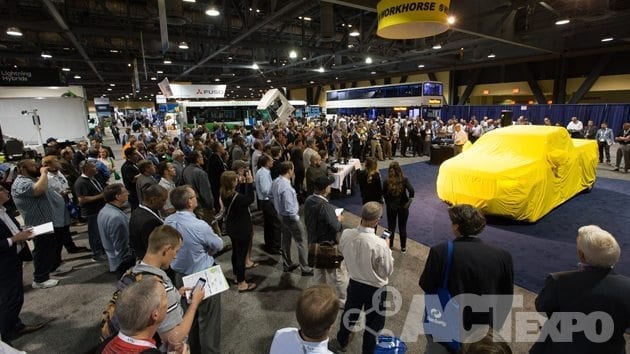Last month’s Advanced Clean Transportation (ACT) Expo in Southern California demonstrated the continued momentum taking place across the transportation industry to push forward low-carbon fuels, more efficient technologies and fleet sustainability.
A key question for the four-day event was what the new administration in the White House and its new policies could mean for fleets, OEMs, fuel providers, state regulators, and other clean transportation stakeholders. To help kick off the conference, progressive policymakers and industry stakeholders representing both sides of the political aisle participated on a panel to share how they are continuing to push the envelope to clean up emissions and modernize goods and people movement.
Daimler, Navistar, Kenworth, Mack and Peterbilt, all agreed on an OEM panel that the industry will continue focusing on fuel efficiency improvements even if the U.S. EPA’s GHG standards for medium- and heavy-duty trucks are modified in some capacity. These major OEMs also expressed a continued commitment to bring various alternative fuel platforms powered by natural gas, propane, hydrogen and electricity to the market; noting that momentum in the space is an important driver.
Dozens of leading fleets—including Bimbo Bakeries, Coca-Cola, Frito-Lay, Nestlé, Penske, UPS, Walmart, Waste Management, among many others—shared with peers why they are forging ahead with alternative fuels and new vehicle technologies to improve economic and environmental performance. A highlight was UPS’s director of fleet procurement, Mike Casteel, discussing how the company has reached its goal of driving 1 billion miles on alternative fueled vehicles one year ahead of schedule, largely due to the company’s use of Class 8 natural gas tractors.
The ACT Expo agenda featured several partner events including the North American Council on Freight Efficiency’s (NACFE’s) Trucking Efficiency workshop and BSR’s Future of Fuels Spring Forum. The Trucking Efficiency workshop discussed the benefits and challenges of adopting various technologies, including idle reduction devices and automated transmissions. The Future of Fuels forum discussed the newly launched Sustainable Fuel Buyers’ Principles—developed by BSR’s members, including UPS, Walmart, Amazon, and others—that are designed to increase the availability of low-carbon fuels.
The news at ACT Expo demonstrated a clear theme: incredible innovation and growth is continuing across all corners of the advanced transportation and clean energy market. The show floor showcased the latest technologies available, hosting more than 25 product debuts and announcements
The annual ACT Expo Fleet Awards recognized fleet operators who have gone above and beyond what has been required to achieve sustainability in their transportation operations. The winners include: Waste Management, Frito-Lay, Saddle Creek Logistics Services, City of Los Angeles, North Kansas City School District, and FortisBC.
In addition to all of the on-site activities at the event, a number of off-site tours were provided to attendees to showcase real world examples of clean transportation projects. American Honda hosted a tour at their North American headquarters where attendees were able to test drive the three brand new Clarity models: the battery electric, fuel cell, and plug-in hybrid. A second tour to the City of Long Beach allowed attendees to see an assortment of alternative fuel vehicles, as well as its renewable fueling infrastructure, an extensive maintenance shop, and fleet charging infrastructure. The final tour to the Long Beach Container Terminal showcased the world’s first zero-emission container terminal that uses fully automated battery electric cargo handling equipment.
If we missed you this year at ACT Expo, we invite you to save the dates for next year—set for April 30 to May 3 back at the Long Beach Convention Center in Southern California with an even greater focus on efficiency improvement strategies, fleet sustainability, transportation electrification, and advanced technologies such as autonomous and connected vehicles.


